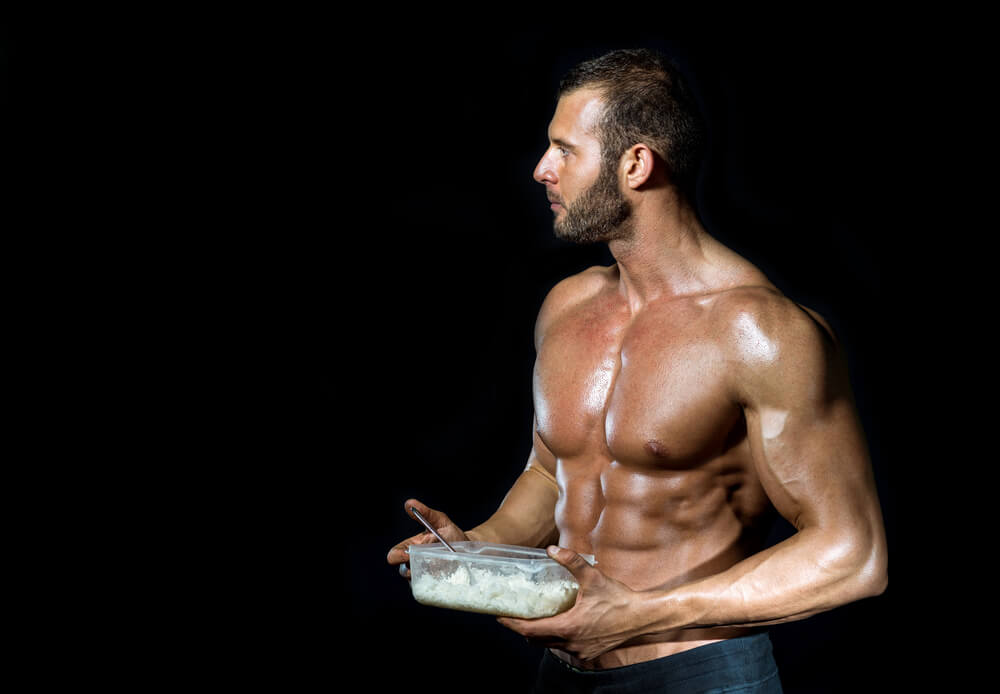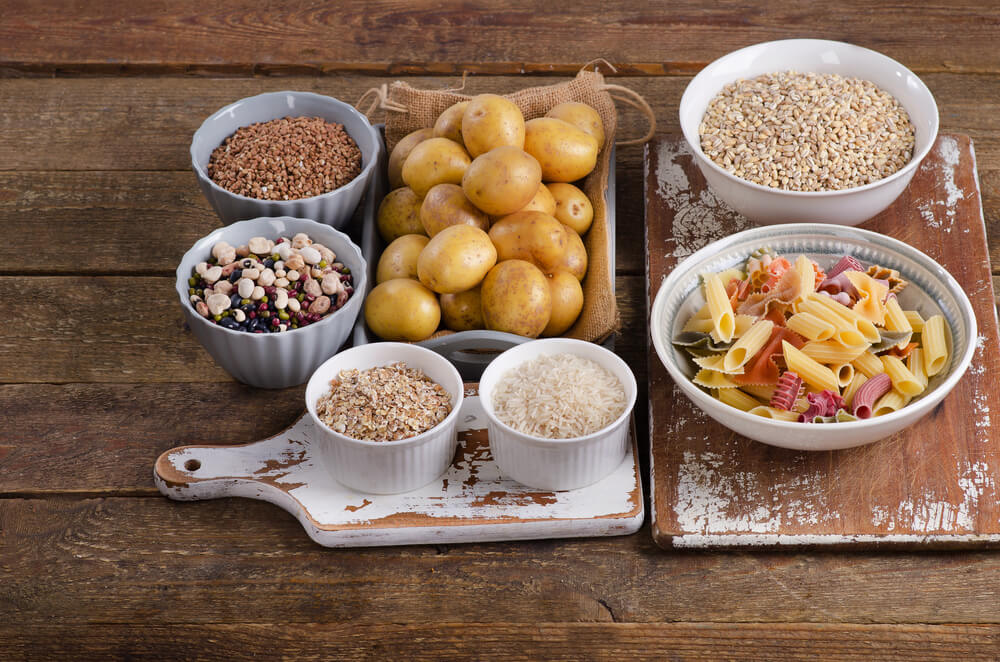
We all know how vital protein is to the muscle building process. But, did you know you also need carbs and understand net carbs? Not sure how and why it works? Rest easy. Why? We get into it all right here.
Athletes, bodybuilders, CrossFitters and powerlifters are always looking for fast gains in muscle size and strength and faster recovery from their daily workouts.
If you are one of the people in that group, where should you turn to achieve that goal?
The secret to getting bigger, faster and stronger lies in your diet.
One of the most vital components of one’s diet in determining success or failure is the proper net carbohydrate intake.
Due to the recent carb hating scene that exists, many athletes have cut them from their diets without realizing that carb intake greatly influences muscle hypertrophy. Carbs are muscle food!
Understanding your needed net carbs is vital for building huge muscle. Let’s look at the importance of a well-balanced diet including your clean carbohydrates.
We’ll also look into the carb’s vital role for increasing muscle size.
A Scientific Look At Carbs
What exactly are carbs when you break down their molecular makeup?
The RSC (2004) states, “Carbohydrates, also called saccharides, are molecular compounds made from just three elements: carbon, hydrogen, and oxygen.”
In essence, there are three main types of carbohydrate that you can consume. They are:
- Starches – Starches are found in foods such as veggies, beans, and grains.
- Fiber – Fiber is only found in foods from plants.
- Sugars – Sugars are found naturally in foods like fruit and milk. They can also be added to processed foods (which you will vow now not to eat).
Why Do You Need Carbs?
Eating complex carbs provides a clean energy source for your entire body. They are the macronutrient that your body uses first for energy. It’s the go-go juice of the macronutrients.
Another reason they are used first is that they can only be stored for a day or two. As a result, your body readily relies on them because they are easily accessible. Besides being an energy source, they also help repair your muscles that you work so diligently to build in the gym each day.

How The Human Body Uses Carbs
It’s important to know how the human body uses carbs so that you understand how they contribute to hypertrophy.
The first step occurs when you insert clean carbs into your mouth. The next step comes when you chew. Right after that comes the scientific part.
Here’s what happens in your body. The carbs you eat are first broken down into glucose. At this point, your body either burns off the glucose or converts it into glycogen to be stored in the liver and muscles as the reserve fuel for when your body needs more energy.
If the liver and muscles are filled to capacity and you still have leftover glycogen, the remainder of that glycogen is turned into fat and stored in your body. Of course, that’s the fat we all have to work so hard to get rid of later on. RSC (2004) attests, “Glucose is the most important carbohydrate fuel in human cells.”
Your body will not waste your precious glucose!

Carbs Are Muscle Food That Promote Growth!
Massive gaining requires massive energy. That energy must be supplied through complex carb intake. Carbs play a specialized role in building and maintaining lean muscle mass. Without them, you will negatively impact your ability to gain size.
What happens when you cut carbs from your diet?
You lose energy and your body must rely on some other energy source.
If you have massively cut carbs before to compete in bodybuilding, or if you’ve tried a low-carb diet such as a keto diet, then you understand what an impact cutting carbs have on your mood, energy, and strength.
Carb cutting does work to get you shredded (temporarily). But, one of the impacts of cutting carbs is losing some of your muscle. Not only will your muscle mass decrease on low carb diets, if you consistently stay on a low carb diet, you could also be reducing your body’s ability to build any new lean muscle tissue.
What Are The Role Of Complex Carbs When It Comes To Hypertrophy?
We typically think of protein as the primary muscle repair and growth macronutrient. But, muscles tissues require amino acids and glycogen to complete the repairing process. You just learned that glycogen is derived from carbs and stored in the liver and muscle as a readily available energy source.
In the absence of carbs, your body has to rely on protein sources for energy. Your body will either convert the protein you eat (food) to energy, thus leaving your body with less protein to repair torn muscle, or your body will just eat its own muscle. Either way, your body is doing the exact opposite of what you want it to do.
Carbs actually assist protein in building muscle because they spare protein.
This Is Yet Another Important Role
You could say that carbs and protein have a symbiotic relationship. When you consume carbs, they trigger an insulin spike. Insulin stimulates the uptake of amino acids by your muscle cells.
Think about what that means for your pre and post workout meals as you work towards gaining huge muscles. That’s right! You must eat carbs both before and after your workouts to get the full gamut of perks. That includes energy, protein sparing and insulin for amino acid uptake.
The easiest way to do this is to find a whey protein shake with an ample amount of carbs and protein to consume both before and after your workout. By consuming protein and carbs together, you allow each macronutrient to perform its job properly. This symbiotic relationship ensures the growth you crave.

Net Carbs To Build Huge Muscles?
Net carbs, what are net carbs?
Your net carb count is the total number of carbs in the foods you eat minus the dietary fiber.
For instance, if you look at the nutrition label on your whey protein, you will see a carb count. Let’s say that the label reads 15 grams of total carbs. Just below that line, you will find “dietary fiber.” If there are 5 grams of dietary fiber, you subtract that from the carbohydrates to get your net carbs. In this example, you would get 10 grams of working net carbs from your whey protein.
If you are using macronutrient ratios to plan your meals, you need to keep this in mind to make sure you meet your net carb intake. Make sure your net carbs, not total carbs, equals your targeted daily intake.
Counting Carbs Using Macronutrient Ratios
If you already use macronutrient ratios to meal prep then you are a step ahead of the rest of the crowd.
Good job!
If you don’t eat according to macronutrient ratios, then it’s time to start.
When you have specific body goals your diet should be very precise so that when you manipulate your food intake, you know what works for your body and what doesn’t. In essence, each time you make a change in your diet, you will know the impact of that one change.
Because everybody is different, there is not a single diet that will work for each person equally. Carb amounts for each person will vary depending on an individual’s body weight, body fat percent and metabolism. The trick is to learn your own body so that you can manipulate it through your diet.
To learn more about how to meal plan and prep based on macros and how to manipulate your macronutrient intake, you should read our article entitled, How Many Calories Should I Eat To Lose Weight.
To make gains, the first step is to increase your carb ratio. A good baseline is to eat between 40 and 60% of your daily calories from clean carbs. Start on the lower end near 40%. Don’t forget: If you over-consume carbs, your body will store the additional carbs as fat, so you don’t want to overeat them. On the opposite end, if you are not gaining muscle size, increase your ratio by increments of 5% each week until you find your ideal carb ratio.
Another simple method to estimate your carb intake is just by your bodyweight.
This is not as precise as macronutrient ratios, but it could help if you just want a baseline to start from. If you are a man who weighs 200 pounds, then eat 80 to 90 grams of carbs per meal. If you are weighing in at less than 190 pounds, then eat 60 to 80 grams of carbs per meal.

Eat Carbs With Each Meal
The reason you should eat carbs with each meal is that they are on a cycle in your body. You have to burn them off before your body can refuel and use more. Giving your body too many at one time may lead to fat gains instead of muscle gains.
A slow, steady supply should help your body use them in a timely manner, fuel your muscles, store what it needs and not leave excess to store as fat. You will know your carb intake is correct when you can put on muscle size while only weighing 10 to 20 pounds over your ideal lean body weight.
How Do You Know If You Are Making Lean Muscle Gains?
You will know you are gaining muscle if you are getting physically stronger. In other words, you are making lean muscle gains if you are able to lift heavier or get in extra reps.
If your strength decreases or stalemates, you know there is still something wrong with your regimen. At that point, it is time to get back to the drawing board.

These Are The Ideal Carbs For Building Muscle
Obviously, you can’t gorge on pizza and donuts for best body results. Too bad for many of you! No one said it would be easy. You have to stick with the carbs that Mother Nature provides.
When choosing carbs, select whole grains. Intermountain Registered Dieticians stated that “Whole grain foods include all parts of the grain kernel including the bran, the germ, the exosphere, and the endosperm.”
Oatmeal – One cup of oatmeal contains 27 grams of carbs. It’s quick and easy to cook. You can soak them overnight and have an instant breakfast or cook them pretty quickly on the stove or in the microwave. Buy steel cut oats. They are superior to processed or instant oats.
Quinoa – A half cup of cooked (boiled) quinoa provides 20 grams of carbs. Quinoa also has a relatively high amount of protein. Of course, this helps to slow down digestion and keep you full for longer periods of time.
Brown Rice – There are 45 grams of carbs in one cup of cooked brown rice. Brown rice is the purest form of rice because it is not processed to remove its outer layer. The outer layer, or germ layer, contains fiber, vitamins, and nutrients that your body can also benefit from.
Sweet Potato – One cup of sweet potato has about 27 grams of carbs and 4 grams of fiber. Your net carb intake would be 23 grams.
Conclusion
Don’t forget: Carbs are muscle food!
Carbohydrates should be the first macronutrient you turn to for growth because your muscles need a continuous energy supply to both grow and repair. Eliminating any food group from your diet, especially your main source of energy, is detrimental to muscle growth. By choosing complex carbohydrates to add to your diet and understanding your necessary net carb intake, your body will be able to build huge muscles and you’ll feel and look amazing.
By Sarah Chadwell, CPT.
Terry
Latest posts by Terry (see all)
- How Important Are Net Carbs For Building Huge Muscle? - Apr 28, 2017
- The Matt Damon Workout Explained - Apr 27, 2017
- Watercress – Benefits And The Best Way To Consume It - Apr 26, 2017










[…] can also help prevent some carbs from being absorbed by your body. Some foods are labeled with a “net carb” rating on it. This takes the num ber of carbs in the food and then subtracts the amount of fiber […]
[…] can also help prevent some carbs from being absorbed by your body. Some foods are labeled with a “net carb” rating on it. This takes the num ber of carbs in the food and then subtracts the amount of fiber […]